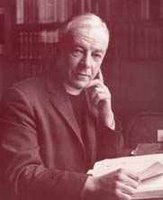Monday, November 28, 2005
Tom Schreiner resources
One item related to a previous post here is an article on perseverance and assurance which no doubt summarizes some of what is found in the book by Schreiner and Caneday.
Thanks to Jim Hamilton whose blog alerted me that these items were now available.
Thursday, November 24, 2005
Thanksgiving Meditation
Here is an important statement from Paul regarding the giving of thanks. But what does it mean when it says to ‘give thanks for all things’? Some seem to think it calls for that false façade which pastes on a smile and seeks to ignore reality in order to say ‘Thanks.’ It does of course raise the honest question of how one is to ‘always’ give thanks ‘for all things’ if some of these things and some of these situations are bad, heart rending, or times when down right evil invades our lives and destroys. Does this passage speak to these times as well and does it really call us to refuse to face up to reality?
The answer is found, I think, it placing this verse in its context (often a key to understanding such things). This verse, first of all follows on from the command in 5:18 to be Spirit-filled. The giving of thanks ‘always’ for ‘all things’ is the second result of being filled with the Spirit mentioned here. Among other things this does suggest that this giving of thanks is not something attainable without divine aid. It is the result of the Spirit’s work within us. Yet, the point is that all believers have the Spirit and, therefore, should see this result at work within them. Thankfulness is evidence of the Spirit at work within us.
Secondly, the context more broadly shows us that this passage is part of the larger discussion of how we are to live in light of the gospel. Chapters 1 & 2 have laid out the marvelous work of salvation which God has done completely by His grace (2:8-9) for people like us who were dead in sin and without hope (2:1, 12). Chapter 3 begins to draw out implications for us of being saved in this way (3:1, ‘for this reason’), and after a digression 4:1 continues this (‘Therefore, I … implore you to walk in a manner worthy of the calling with which you have been called.’) The rest of the letter then continues this description of how we are to live in light of the glorious salvation we have received.
Thus, the call to give thanks in 5:20 is an outgrowth of the gospel. How can we give thanks in all circumstances? Because, no matter what happens, we know that God the Father Almighty has worked at great cost to Himself to save us. If times are hard, life is difficult, pain is present, death has visited, nevertheless, ‘let this blest assurance control, that Christ hath regarded my helpless estate and has shed his own blood for my soul’! No matter what problems assail me, the scriptures teach me that my greatest problem is my own sin which makes me an enemy of God and which I am helpless in myself to change. Yet, this problem, my greatest one, has been forever and completely dealt with in the gospel.
‘My sin, O the bliss of this glorious thought
My sin not in part but the whole
Is nailed to the cross and I bear it no more
Praise the Lord, Praise
the Lord, O my soul.’
Therefore, whatever may assail me I will give thanks. All the smaller blessings which surround me then are icing on the cake and reminders of the care of This One who has saved me. All the hardships which come my way are filtered through the hand of the One who has loved me and saved me even while I was a rebel against Him. How can I then not give thanks always for all things?
When we live in light of the gospel, so much more in the Bible makes sense.
May you have a blessed time in giving thanks.
Sunday, November 20, 2005
Update on Stewart Book
Thursday, November 17, 2005
Wrestling with the Text

In looking over some old sermon notes, I came across this little poem I had written in response to struggling with a fairly difficult passage- one where I really wrestled to understand its meaning and application, but in the end found it to be very rich and especially pertinent to our situation. Here’s the poem:
“Gems to share have I,
But not with the glib passerby.
Come wrestle, struggle and pray.
Then will I yield light for your way.”
I am not posting this because I think this is especially fine poetry but because it is an expression of my soul in learning to wrestle with the text. We are so accustomed to hurry, and we can’t get an extension on sermon preparation- “Sorry folks, the sermon is not yet ready. If you can come back tomorrow I’ll be ready to preach.” We are pressed for time, but if we would understand the Scriptures, apply them to ourselves and be ready to preach them to others, we must take time to wrestle, struggle and pray.
Saturday, November 12, 2005
A Weekend Hymn

As I sat down this evening to prepare for teaching in the morning, my eyes came across my copy of The Church Hymnary, a little hymnal I picked up in Scotland. I had not looked at it recently, so I picked it up, and as I glanced through it I came upon this hymn in the section on evening hymns. I was struck by the view of the church presented here. It was once said of the British Empire that the sun never set on it, meaning that since it spanned the globe it was always day somewhere in the Empire. That is no longer true, but it is certainly true of the Church. I think this is a fitting hymn especially for the weekend as we gather together. It is encouraging to think that the body of Christ worldwide is gathering. We are not alone. As we gather we express our solidarity with our brothers and sisters around the world- the persecuted, the impoverished, the new believer in a country where his new faith makes his life forfeit. In various languages, in widely diverse meeting places, in different circumstances praise will be ascending to the One True, Triune God.
" ‘For from the rising of the sun, even to its setting, My Name will be great among the nations, and in every place incense is going to be offered to My Name, and a grain offering that is pure; for My Name will be great among the nations,’ says the Lord of hosts." (Malachi 1:11)
The day thou gavest, Lord, is ended;
The darkness falls at they behest;
To thee our morning hymns ascended,
Thy praise shall sanctify our rest.
We thank thee that thy Church unsleeping,
While earth rolls onward into light,
Through all the world her watch is keeping,
And rests not now by day or night.
As o’er each continent and island
The dawn leads on another day,
The voice of prayer is never silent,
Nor dies the strain of praise away.
The sun that bids us rest is waking
Our brethren ‘neath the western sky,
And hour by hour fresh lips are making
Thy wondrous doings heard on high.
So be it, Lord! Thy throne shall never,
Like earth’s proud empires, pass away;
Thy kingdom stands and grows for ever,
Till all thy creatures own thy sway.
John Ellerton (1826-1893)
Friday, November 11, 2005
Philosophy of Pastoral Ministry
Perhaps one good way (and one I can accomplish at the moment!) is to point you to a statement of philosophy of pastoral ministry I have drawn up. I do not claim in any way that it is complete or definitive. It is a work in progress. It is the fruit of an effort to express on paper for a specific church what exactly I thought the Scripture says about the work of the pastor.
Wednesday, November 09, 2005
Some Thoughts on Reading

Reading is an essential discipline for the pastor, indeed for any Christian who is able. A few years ago when invited to speak to a group of college students who aspired to the pastorate, I told them (what had become a common line for me), “If you do not like to read, reconsider your calling.” This may sound strong to some, but surely the pastor must be one characterized by much reading of the Scripture at least. Then, if we take seriously the calling to expound the Word of God to the people of God in the sight of God, we will, out of sheer humility and knowledge of our own weakness, desire to read the considerations on the text by others more knowledgeable and more godly than ourselves. Yes, reading- good reading, diligent reading, much reading- is essential for the pastor.
Therefore, I will make a few points of recommendation concerning reading. Much more could be said here, but I will make a start. First, John Piper’s essay, “Brothers, Fight for Your Lives” (in Brothers We are Not Professionals) is brilliant and encouraging in many ways. His encouragement simply to set aside 20 minutes a day for reading and his calculations on what you can accomplish with that have been very helpful to me. Jim Eliff’s essay, “An Argument for Learning,” is also very helpful.
More articles could be listed, but let me conclude with some other specific things that have been helpful to me. During my doctoral work, I began trying to review every book I read. This arose from the desire to capture the thoughts and insights gained from reading. It is discouraging to read something and later not be able to remember what you thought you had learned. This reviewing has become a very helpful discipline. Now, of course the level of reviewing varies- and some have slipped by without recorded comments. Some books receive a thorough review while for others I simply summarize and give the key thoughts which have been stirred in my mind.
Lastly, I have begun keeping a file of quotes from each book. I simply save them in a computer folder titled, “Book Notes.” This has helped me to make use of these gleaned gems in future work. Also, these lists of quotes have often been useful items to share with others. These ideas are ways I seek to make the most of my reading, squeezing optimal use of the effort. May these reflections from my journey encourage you in your own reading.
Monday, November 07, 2005
The Pursuit of Holiness

One of our Wednesday night classes at my church is studying Jerry Bridges’ classic little book, The Pursuit of Holiness. As a part of the class I am re-reading this book which I first read almost 15 years ago in college. As I have re-read especially the first half of the book I have been reminded of how great this little, simply written book is. I cannot recommend it too strongly. If people in our churches grasped the ideas in the early chapters about the necessity of holiness, we would be ready to understand the necessity of oversight. It is not by accident that the book of Scripture which tells us without holiness no one will see the Lord (Heb 12:14), also speaks so strongly of the need for oversight (Heb 13:17). Bridges clearly and simply explains the biblical teaching of the necessity of perseverance, undercutting the sadly common, but false perversion of the doctrine of perseverance- i.e., the idea that one can profess faith, then live a life with no real concern for the things of God and be considered right with God and fit for heaven. The bible teaches no such thing, regardless of how common the idea may be. I do believe the bible teaches that those who are truly converted will persevere in the faith; but the point is that they will persevere. Those who profess faith but do not go on to progress in holiness and Christ-likeness (progress, not obtain perfection) show that they have never truly been converted (see Titus 1:16).
If you are trying to communicate these ideas with your church (or class or small group), a good way to start could be introducing this little book. Its size and short chapters make it a book that is not intimidating. And you can find inexpensive copies fairly easily.
P.S. While searching for an image of the book to include, the search engine suggested that perhaps I meant "pursuit of happiness" rather than "pursuit of holiness." Interesting!
Saturday, November 05, 2005
Thoughts on Books for Reading with Your Children

One thing I hope to do from time to time is to share my thoughts on certain books on biblical and theological issues for children. It is essential for the church to train parents to disciple their children. One part of this is reading good books to them. Reclaiming this practice will not only instruct a new generation of children but will also lead to dramatic growth in learning for the parents as well.
For the first installment in this topic, let me point out a short piece I wrote a few years back while we were still in Scotland. In it I recommend several books we found especially helpful for our children when they were in the range of 5 years old and younger. In future posts on this I will largely comment on books as I read them to my boys as well as share the thoughts I have jotted down along the way about books we have read together.
P.S. If you are not married or are married but do not yet have children, it is never too early to begin collecting thoughts and books for this important and fun task. If your children are grown, you can be an incredible blessing by passing on good thoughts and books for your grandchildren.
Friday, November 04, 2005
Missions Undergirded by Theology, Stewart Again

Returning to thoughts from James Stewart’s great little book on missions, Thine is the Kingdom, Stewart regularly pounds home the theme that our eschatology matters in missions. While there are differences in the realm of eschatology, we must be certain and clear that Christ is reigning now- he is not waiting to reign. Christ reigns. The enemy is still running about; the final, ultimate end of the enemy is yet future; but, Christ reigns. This is important for us to hold on to. Stewart writes:
“Now there is all the difference in the world between going out on mission with the motive of helping Christ to become King, and going out because the King has sent you.” (pg.27)Let us go forth in full confidence that Christ has conquered and now reigns. We go not forth to help Him achieve His victory. We go out because He is victorious, and we call all people to submit to this victorious Christ rather than be conquered as His enemies.
“Knowing that the Kingdom had appeared in time and that Christ was reigning now, they turned to face the future with a new intensity of hope, a hope as certain as the promises of God. Realizing that the decisive battle had been won, they flung themselves with magnificent abandon into the remaining toils and dangers of the campaign, sustained in all the hardships and dangers and persecutions of their mission by the certainty of the coming end, and straining their eyes through the darkness towards the final triumph of the Lord. Each Eucharist was a foretaste of the Messianic banquet and marriage supper of the Lamb.” (pgs.31-32)
“The men of the Bible know and declare that if the powers of darkness have a lot of rope nevertheless the end of the rope is in the hands of God. They see that God in His sovereignty can use even what is pagan and demonic as the agent of His purifying judgment upon Israel and the Church.” (pg.56)
“… the watchword on the banner of the Church’s mission, Christus Victor, represents not a pious hope, but a historic, irrevocable fact.” (pg.73)
Wednesday, November 02, 2005
Newton, Poetry and the Pastorate

Poetry is very valuable for pastoral ministry. At one level, it is valuable for pastoral ministry because it is valuable for life in
general! Yet, our culture has largely lost poetry. We can see this in a common inability to deal with symbols and appreciate the symbolic. Our flat understanding of language results in misunderstandings and poor exegesis. It also often hinders us in the effort to communicate deep truths. Have you ever noticed how many of the great preachers and theologians of the past wrote great poetry (including hymns)?
Here is a poem from John Newton about pastoral ministry. It is the source of his famous statement that pastoral ministry is "A sorrow full of joy". This poem and many other good poems from pastors and theologians of the past can be found in Worthy Is The Lamb: Puritan Poetry in Honor of the Savior (Soli Deo Gloria Publications, 2004).
Travailing in Birth for Souls
by John Newton
What contradictions meet
In ministers employ!
It is a bitter sweet,
A sorrow full of joy;
No other post affords a place
For equal honor or disgrace!
Who can describe the pain
Which faithful preachers feel,
Constrained to speak in vain,
To hearts as hard as steel?
Or who can tell the pleasures felt,
When stubborn hearts begin to melt?
The Savior's dying love,
The soul's amazing worth,
Their utmost efforts move,
And draw their bowels forth;
They pray, and strive, their rest departs,
Till Christ be formed in sinners' hearts.
If some small hope appear,
They still are not content;
But, with a jealous fear,
They watch for the event.
Too oft they find their hopes deceived,
Then how their inmost souls are grieved!
But when their pains succeed,
And from the tender blade,
The ripening ears proceed,
Their toils are overpaid.
No harvest-joy can equal theirs,
To find the fruit of all their cares.
On what has now been sown,
Thy blessings, Lord, bestow;
The power is Thine alone,
To make it spring and grow.
Do Thou the gracious harvest raise,
And Thou alone shalt have the praise.


